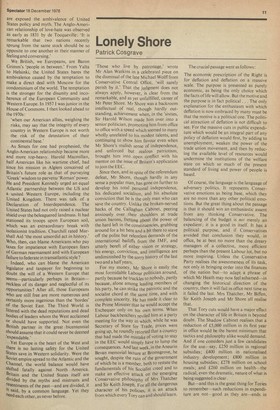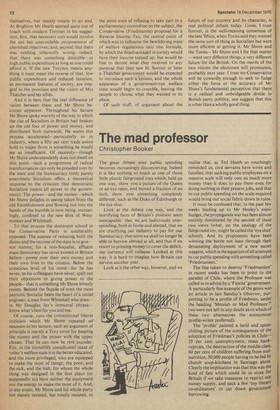Lonely Shore
Patrick Cosgrave
'Those who live by patronage,' wrote Mr Alan Watkins in a celebrated piece on the dismissal of the late Michael Wolff from Conservative Central Office, 'will surely perish by it.' That the judgment does not always apply, however, is clear from the remarkable, and as yet unfulfilled, career of Mr Peter Shore. Mr Shore was a backroom intellectual of real, though hardly outstanding, achievement when, in the 'sixties, Sir Harold Wilson made him over into a senior politician, promoting him from office to office with a speed which seemed to many wholly unrelated to his modest talents, and continuing to show him favour even when Mr Shore's mulish sense of independence, and unforced but zealous patriotism, brought him into open conflict with his mentor on the issue of Britain's application to join the EEC.
Since then, and in spite of the referendum defeat, Mr Shore, though hardly in any sense a popular man, has gone on further to develop his total personal independence, his dedicated socialism, and his absolute conviction that he is the only man who can save the country. Unlike the broken-nerved hacks of the Callaghan Cabinet, peering anxiously over their shoulders at trade union barons, fretting about the power of the hard left in the constituencies, grubbing around for a bit here and a bit there to stave off the polite but relentless demands of the international bailiffs from the IMF, and utterly bereft of either vision or strategy, his energy, conviction, and intelligence are undiminished by the sorry history of the last two and a half years.
For my money, Mr Shore is easily the most formidable Labour politician around, partly because he truckles to nobody, partly because, alone among leading members of his party, he can strike the patriotic and the socialist chord at the same time, and with complete sincerity. He has made it clear to the Prime Minister that he would accept the Exchequer only on his own terms. When Labour backbenchers reviled him at a party meeting for the way in which, while he was Secretary of State for Trade, prices were going up, he roundly retorted that a country that had made the mistake of voting to stay in the EEC would simply have to lump the consequences. And last week, in the Aneurin Bevan memorial lecture at Bromsgrove, he sought, despite the ruin of the government of which he is a member, both to restate the fundamentals of his Socialist creed and to make an effective attack on the emerging Conservative philosophy of Mrs Thatcher and Sir Keith Joseph. For all the dangerous character of his Policies, it is an attack from which every Tory can and should learn.
The crucial passage went as follows: The economic prescription of the Right is for deflation and deflation on a massive scale. The purpose is presented as purely economic, as being the only choice which the facts of life will allow. But the motive and the purpose is in fact political ... The only explanation for the enthusiasm with which deflation is now embraced by many must be that the motive is a political one. The political attraction of deflation is not difficult to see. For the massive cuts in public expenditure which would be an integral part of any policy of deflation would first, by adding to unemployment, weaken the power of the trade union movement, and then by reducing the available level of resources would undermine the institutions of the welfare state on which so much of the present standard of living and power of people is based.
Of course, the language is the language of adversary politics. It represents Conservative emotions as being base, which they are no more than any other political emotions. But the great thing about the passage is that it should win an enthusiastic assent from any thinking Conservative. The balancing of the budget is not merely an expedient; it is a good in itself. It has a political purpose, and if Conservatives avoided that conclusion they would, in office, be at best no more than the dreary managers of a collective, more efficient perhaps than the present Labour lot, but no more inspiring. Unless the Conservative Party realises the awesomeness of its task, not only in bringing order into the finances of the nation but—to adapt a phrase of which Mr Heath may now feel ashamed—in changing the historical direction of the country, then it will fail in office next time as it failed the last. Mrs Thatcher, Mr Biffen, Sir Keith Joseph and Mr Shore all realise that.
That Tory cuts would have a major effect on the character of life in Britain is beyond doubt. The Shadow Cabinet realises that a reduction of £5,000 million in its first year in office would be the barest minimum that tactics and philosophy alike would demand. And if one considers just a few candidates for the axe--say, £250 million in regional subsidies; £400 million in nationalised industry development ; £800 million in housing subsidies; £278 million on school meals; and £260 million on health—the radical, even the dramatic, nature of what is being suggested is clear.
But—and this is the great thing for Tories to remember—such reductions in expenditure are not—good as they are—ends in
themselves, but merely means to an end. At Brighton Mr Heath seemed quite out of touch with modern Toryism in his suggestion, first, that necessary cuts would involve the sad but unavoidable postponement of cherished objectives; and, second, that there was nothing inherently wrong-indeed, that there was something desirable—in high public expenditure as long as one could afford it. If the new Toryism means anything it must mean the reverse of that: low public expenditure and reduced taxation, as permanent features of society, are integral to the promises and the vision of Mrs Thatcher and her allies.
And it is here that the real difference of vision between them and Mr Shore becomes apparent. Throughout his lecture Mr Shore spoke warmly of the way in which the rise of Socialism in Britain had broken up the old foci of power and money, and distributed both outwards. He wants this process accelerated—particularly so in industry, where a fifty per cent trade union hold in major firms is something he would see as insufficient. Of necessity—though Mr Shore understandably does not dwell on this point—such a programme of radical transformation can only be presided over by the state and the bureaucracy (only purely anarchistic Socialism offers a theoretical response to the criticism that democratic Socialism means all power to the government). The power--and the money--which Mr Shore delights in seeing taken from the old Establishment and flowing out into the hands of the humble is now being, increasingly, confined to the new elite of Westminster and Whitehall.
To that process the dominant school in the Conservative Party is unalterably opposed. The essence of reducing both the duties and the income of the state is to give-not restore, for a non-Socialist, affluent mass democracy has never existed in Britain before-power over their own money and their own lives to the citizens. Below the conscious level of his mind--for he has never, as his colleagues have never, spelt out their objections to giving power to the people—that is something Mr Shore bitterly resists. Behind the facade of even the most patriotic Socialist beats the heart of a social engineer, a man from Whitehall who doesin Mr Douglas Jay's immortal phrase know what's best for you and me.
Of course, runs the conventional liberal criticism which Mr Shore repeated ad nauseam in his lecture, such an argument of principle is merely a Tory cover for keeping the money and the power with the upper classes. That lie can now be rent asunder. For, in the incredibly complicated maze of today's welfare state it is the better educated, and the more privileged, who are equipped to make the most of things; the poor, and the sick, and the halt, for whom the whole
thing was designed in the first place (or supposedly so) have neither the equipment nor the energy to make the most of it. And, in any event, Mr Shore and his whole party not merely resisted, but totally resisted, to the point even of refusing to take part in a parliamentary committee on the subject, the Conservative (Friedmanite) proposal for a Reverse Income Tax, the central point of which was to subsume the bewildering mass of welfare regulations into one formula, by which the disadvantaged in society would have their income topped up, but would be free to devote what they received to any purpose that they saw fit. Sooner or later a Thatcher government would be expected to introduce such a system, and the whole apparatus of a government-run welfare state would begin to crumble, leaving the people to choose what they wanted in its place.
Of such stuff, of argument about the
future of our country and its character, is real political debate today. Gone, I trust forever, is the well-meaning consensus of the late 'fifties, when Tories said they wanted the same sort of thing as Socialists but were more efficient at getting it. Mr Shore and the Tories--Mr Shore and I for that matter -want very different things, a very different future for the British. On the merits of the two visions the electorate will pronounce, probably next year. I trust no Conservative will be cowardly enough to seek to fudge either the force or the accuracy of Mr Shore's fundamental perception that there is a radical and unbridgeable divide in British party politics; nor suggest that this is other than a wholly good thing.















































 Previous page
Previous page